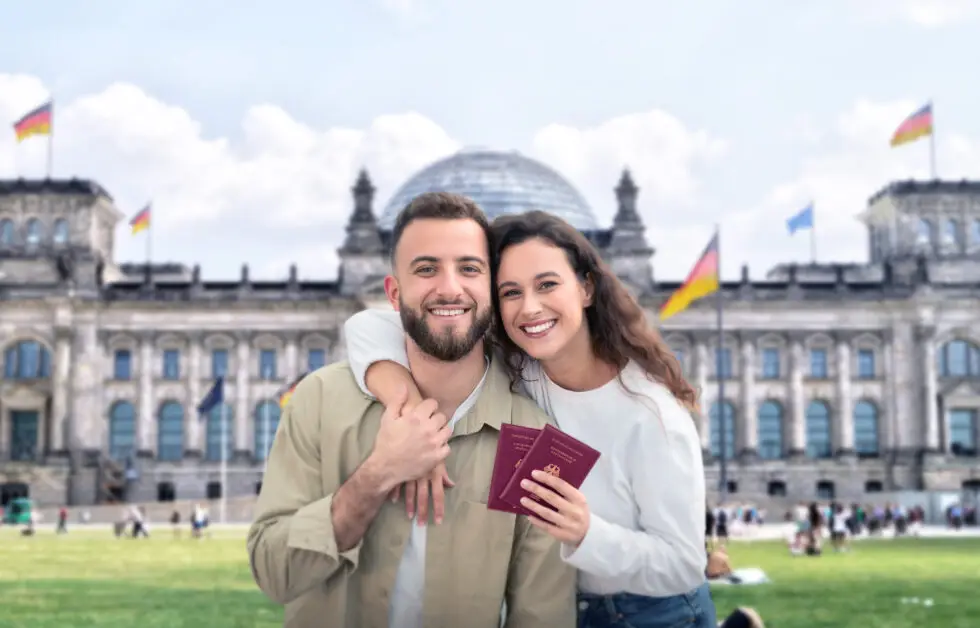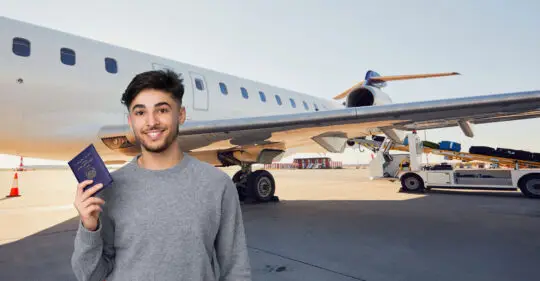What is § 30 AufenthG?
If you would like to bring your spouse to Germany, Section 30 of the Residence Act (AufenthG) is the most important legal basis for spousal reunification. This paragraph specifies the exact conditions under which your spouse can obtain a visa and a residence permit.
There are various regulations that apply depending on the residence status of the spouse living in Germany. You should be fully aware of these requirements in order to make your application successful. But don't worry - we will help you to understand the complex requirements step by step.
Definition and purpose of Section 30 AufenthG
§ Section 30 AufenthG defines the conditions under which spouses can obtain a residence permit in Germany.
This regulation on family reunification can apply to spouses of third-country nationals who are already living in Germany, but also if you are planning to travel to Germany and apply for a visa together with your spouse and have a valid residence permit here.
The most important requirements that you must observe are
- Both spouses must be at least 18 years old and should generally have at least basic German language skills (A1 level) in order to ensure successful integration. (Section 30 (1) sentence 1 numbers 1 and 2 AufenthG.
- Secured residence status of the spouse living in Germany (Section 30 (1) no. 3 AufenthG): Various Residence permit come into question here, which form the basis for spousal reunification. Specific requirements apply depending on the type of residence permit.
Relevance for the reunification of spouses
1. Settlement permit or EU permanent residence (Section 30 (1) sentence 1 no. 3 a and b AufenthG)
Does your spouse have a Settlement permit or a permit for EU permanent residence permitthe general requirements for spouse reunification are usually easier to fulfill.
In this case, proof of German language skills is particularly important. A Settlement permit is considered a secure Residence permit, which is unlimited and comes with extensive rights.
2. residence permit under certain sections of the Residence Act (Section 30 (1) sentence 1 no. 3 c)
If your spouse has a residence permit in accordance with § 18d, § 18f or § 25 para. 1 or para. 2, sentence 1 (first alternative), you are also entitled to spousal reunification.
The special feature: These residence permits often relate to humanitarian reasons, e.g. for persons entitled to asylum or recognized refugees. German language skills are also required here, but there are numerous exceptions and special regulations.
3. a residence permit for two years (§ 30 para. 1 sentence 1 no. 3 d)
If your spouse has held a residence permit in Germany for at least two years, you can also apply for spousal reunification. It is important here that the residence permit is not subject to certain conditions that preclude the granting of a Settlement permit .
4. marriage already existed when the residence permit was issued (Section 30 (1) sentence 1 no. 3 e)
If the marriage already existed prior to the granting of a residence permit pursuant to Section 7 (1) sentence 3 or pursuant to Sections 3, 4, 5 or 6 of Section 30 AufenthG and the stay of the spouse living in Germany is expected to last longer than one year, spousal reunification is generally possible.
5. residence permit according to § 38a AufenthG (§ 30 para. 1 sentence 1 no. 3 f)
If your spouse has a residence permit in accordance with § 38a AufenthG, which applies to long-term residents from other EU countries, it is also possible for them to join you. In this case, it is important that the marital partnership already exists in the member state in which your partner has been granted residence status.
6. EU Blue Card, ICT Card or Mobile ICT Card (Section 30 (1) sentence 1 no. 3 g)
If your spouse has an EU Blue Card, an ICT card (Intra-Corporate Transfer) or a Mobile ICT Card there are particularly favorable conditions for spouse reunification.
In this case, there is even no obligation to provide proof of German language skills, as the Blue Card and similar titles are issued to particularly qualified specialists.
Requirements for the reunification of spouses according to § 30 AufenthG
In order for the application for spouse reunification to be successful, certain requirements must be met. It is important that you and your spouse are fully aware of the requirements under § 30 AufenthG in order to avoid unnecessary delays. Here you will find an overview of the basic conditions and the most important exceptions that can help you to obtain a residence permit for your spouse even under difficult circumstances.
General requirements
The general requirements for the reunification of spouses are clearly defined. You should pay attention to these points:
- Minimum age: Both spouses must be at least 18 years old.
- Secured Residence permit of the partner living in Germany: Your spouse must already have a valid residence permit. Accepted Residence permit are e.g:
- Settlement permit
- Permanent residence-EU
- Residence permit for specific purposes (e.g. work, research)
- Marital cohabitation: You must prove that the marriage still exists in Germany and that you intend to live together.
- Living space: Sufficient living space must be available, which also includes the spouse joining the family.
Exceptions for lack of German language skills for the reunification of spouses according to § 30 AufenthG
There are special exceptions for the reunification of spouses if the general requirements such as proof of basic German language skills cannot be met. The most important exceptions are summarized here:
Special regulations for certain residence permits
If the spouse living in Germany has a residence permit on humanitarian grounds, special regulations apply.
These residence permits include
- §Section 23 (4) AufenthG: Residence for persons who have been admitted to the federal territory on the basis of humanitarian admission (e.g. resettlement refugees).
- Residence permit pursuant to Section 25 (1) AufenthG and Section 25 (2) AufenthG: Residence permit for recognized persons entitled to asylum, residence for refugees with refugee status, residence for persons enjoying subsidiary protection.
- § Section 26 (3) Residence Act: Long-term residence regulation for persons with humanitarian status Residence permit.
- Settlement permit according to § 26 paragraph 4 AufenthG for people with subsidiary protection: If an indefinite Settlement permit was acquired after successful integration from a humanitarian Residence permit
In these cases, the obligation to provide proof of German language skills does not apply if the marriage already existed before the foreigner entered Germany. This recognizes that the reunification of spouses is also made easier in difficult situations.
Special cases of hardship and exceptions
Sometimes there are special circumstances that make it impossible for you to fulfill the requirements. In such cases of hardship, it is possible to deviate from the regular requirements:
- Hardship regulation: Is there exceptional hardship, e.g. in the case of a difficult family situation or separation due to exceptional circumstances? In these cases, Foreigners' office can waive the otherwise applicable requirements.
- Little need for integration: If your spouse is demonstrably well integrated or only has a low need for integration due to previous experience (e.g. knowledge of German due to a longer stay abroad), there is no obligation to take part in the integration course.
- Professional qualifications: Is your partner highly qualified and has an EU Blue Card, for example? Then no German language skills need to be presented, as the focus here is on professional integration.

Step-by-step guide: How to submit your application for Section 30 AufenthG
Applying for spousal reunification can often seem complicated. But if you proceed step by step and prepare all the necessary documents carefully, you will significantly increase your chances of success. In this guide, we will show you which steps you need to take, which documents are really important and how you can be successful even if you don't speak German.
Records and documents
Before you submit the application for spousal reunification, you should prepare all the relevant documents in full. Careful and complete compilation of the documents is crucial to ensure that there are no delays later on. Here is an overview of the most important documents:
Valid passport of both spouses
➔ The passport of the spouse joining you must be valid for at least 6 months at the time of entry.Marriage certificate
➔ Make sure that the marriage certificate is officially recognized and, if necessary, has an apostille or translation.Proof of German language skills
➔ As a rule, the "Start Deutsch 1" certificate (A1) is required. If you are exempt from the German language requirement, you must enclose the relevant proof (e.g. certificates or declarations).Proof of secure means of subsistence
➔ This includes current salary statements, bank statements for the last three months and confirmation from your employer.Tenancy agreement and certificate of residence
➔ The living space must be large enough to accommodate the spouse moving in with you. If necessary, have this confirmed by the landlord.Proof of health insurance
➔ Proof that your spouse has health insurance after entering Germany.
Tip: Make copies of all documents and create a list so that you don't overlook anything. This way, you will be optimally prepared for the interview at Foreigners' office .
Important proof of missing language skills
If your spouse cannot provide proof of the required German language skills, it is important to be well prepared. Here is an overview of which documents can help in such cases:
Certificate for health reasons:
A medical certificate confirming that learning the language is not possible due to a physical or mental illness.Certificate of missing language courses in your home country:
Ask a language school or embassy to certify that there was no opportunity to take part in a German course in your region.Proof of visa exemption:
Does your spouse come from a country that does not require a visa for long-term stays? Then add a confirmation of visa exemption.
Application at the responsible embassy
Once all the documents are complete, the next step is the actual application. Here is a brief guide on how you should proceed:
Make an appointment:
➔ Make an appointment at the German embassy in your home countryFill out the application:
➔ Fill out the application completely. Make sure that all information is correct and consistent. Errors or contradictory information can delay the application.Submit documents:
➔ If your spouse is already in Germany, they can inform the Foreigners' office that you are applying for a visa and submit all the documents there. The Foreigners' office can then decide immediately when the request for approval comes from the embassy.Your spouse can also submit a declaration of commitment at Foreigners' office . This allows the embassy to see that their livelihood in Germany is secured. Bring all the necessary originals and copies of the documents with you to the appointment. A structured folder will help you to keep an overview.
Pay fees:
➔ Fees are charged for processing the application. These vary depending on the authority and residence status. Find out in advance what costs you will incur.Wait for a decision:
➔ After submitting the application, it usually takes several weeks before you receive a response. Keep all communication channels open during this time and respond quickly to any queries.
Tip: Use the time to continue preparing for the move and integration. When your spouse comes to Germany, a well-prepared arrival and initial support with integration (e.g. language courses, exploring the area together) are important.
Tips and common mistakes when reuniting with your spouse
Applying for spousal reunification can be a challenge for many people. Small mistakes or misunderstandings regarding the requirements often lead to the entire process being unnecessarily delayed. To prevent this from happening to you, we have compiled the most common sources of error and valuable tips to help you with your application.
Typical sources of error and how to avoid them
Many applications are rejected due to small but crucial errors. You should therefore pay particular attention to the following points:
Incomplete documents:
➔ Make sure that you submit all required documents, such as passports, marriage certificate, language certificates and income certificates, in a complete and well-organized manner. Copies are often missing or documents are not officially notarized.Incorrect information in the application:
➔ Avoid contradictory or incorrect information. Even small discrepancies, such as different spellings of names or incorrect dates, can lead to the application being rejected. Check all data carefully before submitting the application.Missing proof for exceptions:
➔ If you wish to make use of an exception (e.g. no language skills due to health reasons), be sure to enclose the relevant proof. Without this, your application will often be rejected as incomplete.Late submission of documents:
➔ Submit missing documents as soon as possible if the authority asks for them. Longer delays can lead to rejection.Insufficient living space:
➔ Make sure that the living space meets the legal requirements. A common rule is that there must be at least 12 square meters of living space for each family member.
Tip: Create a detailed checklist with all the required documents and check it several times before submitting the application.
Everyday life with § 30 AufenthG
After your spouse has successfully obtained a residence permit in accordance with § 30 AufenthG, a new phase of life begins in Germany. But what exactly does this mean for everyday life? What rights and options do you and your spouse have? Here I will show you what you should pay attention to in everyday life, what advantages and restrictions there are and how you can best prepare for the next phase.
Travel with § 30 AufenthG
With a residence permit in accordance with § 30 AufenthG, your spouse can travel within the Schengen area. Nevertheless, you should bear a few points in mind so that there are no problems when you return to Germany:
Travel within the Schengen area:
➔ With a residence permit in accordance with Section 30 AufenthG, your spouse may stay freely for up to 90 days within 180 days in the countries of the Schengen area, including France, Spain, Italy and many other EU countries. Important: This regulation only applies for tourist purposes, not for work or study stays.Longer stays abroad:
➔ If your spouse is outside Germany for longer than 6 months, the residence permit will become invalid. If you are planning a longer absence, you should clarify this in advance with Foreigners' office and apply for a special permit if necessary.Travel outside the Schengen area:
➔ For travel to countries outside the Schengen area (e.g. the USA, Canada or Turkey), your spouse will need a visa, which must be applied for on the basis of nationality. Make sure that the German Residence permit is valid for the entire duration of the trip to ensure a smooth return.
Tip: Find out about the entry regulations of the destination country before every trip and make sure that all travel documents are up to date.
Extension of § 30 AufenthG
A residence permit in accordance with § 30 AufenthG is based on the spouse's Residence permit and is linked to this Residence permit. Therefore, there is no time limit and the Residence permit can also be valid for 5 years if the passport and the spouse play along
The Residence permit must be extended in good time before it expires. To ensure that the extension runs smoothly, you should note the following points:
Plan your lead time:
➔ Apply for an extension at least two to three months before your current residence permit expires at Foreigners' office. If you apply later, there may be overlaps that jeopardize the Residence permit .
Attention! In accordance with § 30 Paragraph 3 AufenthG, you do not have to prove that you have living space in accordance with § 29 Paragraph 1 No. 2 AufenthG and that your livelihood is secured in accordance with § 5 Paragraph 1 No. 1 for the extension. The decisive factor is that your marriage has lasted.
The path from § 30 to Settlement permit or Naturalization
Spousal reunification in accordance with § 30 AufenthG can be the first step towards long-term residence in Germany. Many spouses would like to improve their status further after a few years - either by acquiring the Settlement permit or by Naturalization. But what steps are necessary for this?
Settlement permit:
➔ Your spouse can apply for a Settlement permit if he or she:
- For at least five years has held a residence permit.
- German language skills (B1 level).
- proof of participation in an integration course).
- The required proof of payment into the pension system is available.
- The identity has been clarified.
Naturalization:
➔ With the new Naturalization Act, you can be naturalized after 5 years of legal residence in Germany. With a C1 certificate and special integration achievements, Naturalization can also be naturalized after 3 years.
The following requirements must also be met:
- Proof of sufficient knowledge of German (B1 level)
- Secure livelihood
- Passing the naturalization test
- Signed declaration of loyalty
- Clarification of identity
- Proof of at least 5 years legal residence
Tip: Together with your spouse, think about which path best suits your long-term goals and plan in good time so that all requirements are met.
Naturalization with § 30 AufenthG?
Conclusion on the reunification of spouses according to § 30 AufenthG
The reunification of spouses according to § 30 AufenthG is an essential regulation for family reunification in Germany. With the right proof of family ties and the required language skills, you can successfully apply for a residence permit for your partner.
Important points summarized
- Proof of marriage: Provide a valid marriage certificate and a notarized translation.
- Language skills: German language skills at A1 level are generally required.
- Sufficient living space and livelihood: Proof of secure financial means and living space is required.
- Residence permit Spouse: Your spouse must have a valid residence permit for the application for § 30 AufenthG Residence permit
- Settlement permit and Naturalization : You can apply for both Settlement permit and Naturalization from § 30 AufenthG.
Conclusion and future of Section 30 AufenthG
The reunification of spouses will continue to play a central role in the integration of families in the future. Good preparation and timely submission of application documents increase the chances of successful reunification.
FAQ - Important questions about § 30 AufenthG and the reunification of spouses
§ Section 30 AufenthG regulates the reunification of spouses in order to enable foreign spouses of persons living in Germany to obtain a residence permit.
- Valid marriage certificate
- Proof of German language skills (A1)
- Sufficient living space and a secure livelihood
The embassy in the home country checks the authenticity of the marriage, language skills, living space and that the spouse is able to support themselves. If a spouse lives in Germany, they can submit the documents to Foreigners' office , which will then forward them to the embassy, which will make a decision.
Depending on the country (embassy) and authority, the process can take between 3 and 12 months.
Spouses of persons with a valid Residence permit or German citizens are entitled if the requirements are met.










